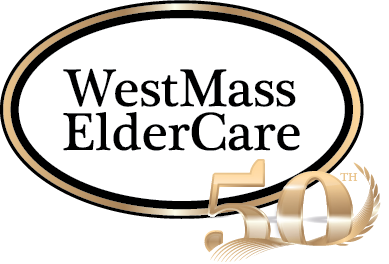Just like a nautical anchor grounds ships and keeps them stable during rough seas, WestMass ElderCare’s (WMEC) ANCHOR program supports vulnerable members of our community when they need it most. Short for Advocacy and Navigating Care in the Home with Ongoing Risk, ANCHOR helps those who lack support structures and do not know where to find help.
See how WMEC’s ANCHOR program empowers the entire community by raising those most in need.
Helping Those Who Aren’t Aware of Help
While most of WMEC’s programming is available to older adults or their caregivers who seek assistance, ANCHOR is for largely isolated seniors who do not have support networks and may not know how to ask for help. These vulnerable people have neither a formal support network (a state-appointed care manager and/or in-home care providers) nor an informal one (children or siblings, for example). Due to the lack of support, many can go without food, electricity, running water, heat, or other necessities—often because they do not realize they can get help. As time goes on, they become more reluctant to seek help due to embarrassment, lack of knowledge, mental health issues, or becoming accustomed to their situation.
This is where ANCHOR comes in.
Advocacy and Navigating Care in the Home with Ongoing Risk — In Brief
Older adults are referred to the ANCHOR program when their situation is deemed most in need of help. As they may be without family or friends to start this process, it is often home-delivered meal drivers or members of local organizations like hospitals, police, and/or the legal system who refer an individual for services.
Due to the intensive nature of the case management it provides and the unique needs of the people it helps, ANCHOR is a limited-time service. Complex Care Coordinators assist elders for six months before deeming if they need another six months to achieve their goals. The program ends after 12 months, or sooner if the consumer is stable and secure.
During this time, a coordinator assesses the consumer’s situation, listens to their opinions, needs, and wants, and works with them on their goals. WMEC’s staff works with the older adult to restore safe living conditions, whether that means food security, access to heating and clean water, setting up bill payment schedules, or making improvements to meet housing codes
WMEC’s Complex Care Coordinator, Jessica Valentine, is currently assisting one such senior whose home has been condemned due to a lack of water, heat, and sanitation. However, the elder refused to live elsewhere. Jessica worked with local utilities to get her consumer approved to restart their utilities. At the same time, she makes sure that the consumer’s home is clean and stocked with food.
She completes her tasks with smiles and aplomb because she knows she’s helping someone to stay independent.
How You Can Support the ANCHOR Program
Where does ANCHOR fit in as there are many options for services and support? ANCHOR supports older adults whose lifestyles may be different than others. Often the legal system or hospitals may be working with individuals but the person needs more intensive support and resources which the ANCHOR Coordinator can offer.
The first step you can take to support ANCHOR is to help elders who may not have anyone else. Taking time to listen and meet them where they are is a positive first step. These consumers see things differently and can benefit greatly when others respect that and work within those parameters. After all, everyone deserves care, consideration, and autonomy.
For other ways to ensure our Complex Care Coordinator has the support and resources to perform her duties, donate today! Whether you give money to a specific program or the organization as a whole, WMEC’s services complement one another, ensuring that older adults receive the support they need, whatever that may be.
While most of WMEC’s programming is available to older adults or their caregivers who seek assistance, ANCHOR is for largely isolated seniors who do not have support networks and may not know how to ask for help. These vulnerable people have neither a formal support network (a state-appointed care manager and/or in-home care providers) nor an informal one (children or siblings, for example). Due to the lack of support, many can go without food, electricity, running water, heat, or other necessities—often because they do not realize they can get help. As time goes on, they become more reluctant to seek help due to embarrassment, lack of knowledge, mental health issues, or becoming accustomed to their situation._x000D_
_x000D_
This is where ANCHOR comes in._x000D_
_x000D_
_x000D_
Advocacy and Navigating Care in the Home with Ongoing Risk — In Brief
_x000D_
Older adults are referred to the ANCHOR program when their situation is deemed most in need of help. As they may be without family or friends to start this process, it is often home-delivered meal drivers or members of local organizations like hospitals, police, and/or the legal system who refer an individual for services._x000D_
_x000D_
Due to the intensive nature of the case management it provides and the unique needs of the people it helps, ANCHOR is a limited-time service. Complex Care Coordinators assist elders for six months before deeming if they need another six months to achieve their goals. The program ends after 12 months, or sooner if the consumer is stable and secure._x000D_
_x000D_
During this time, a coordinator assesses the consumer’s situation, listens to their opinions, needs, and wants, and works with them on their goals. WMEC’s staff works with the older adult to restore safe living conditions, whether that means food security, access to heating and clean water, setting up bill payment schedules, or making improvements to meet housing codes_x000D_
_x000D_
WMEC’s Complex Care Coordinator, Jessica Valentine, is currently assisting one such senior whose home has been condemned due to a lack of water, heat, and sanitation. However, the elder refused to live elsewhere. Jessica worked with local utilities to get her consumer approved to restart their utilities. At the same time, she makes sure that the consumer’s home is clean and stocked with food._x000D_
_x000D_
She completes her tasks with smiles and aplomb because she knows she’s helping someone to stay independent._x000D_
_x000D_
_x000D_
How You Can Support the ANCHOR Program
_x000D_
Where does ANCHOR fit in as there are many options for services and support? ANCHOR supports older adults whose lifestyles may be different than others. Often the legal system or hospitals may be working with individuals but the person needs more intensive support and resources which the ANCHOR Coordinator can offer._x000D_
_x000D_
The first step you can take to support ANCHOR is to help elders who may not have anyone else. Taking time to listen and meet them where they are is a positive first step. These consumers see things differently and can benefit greatly when others respect that and work within those parameters. After all, everyone deserves care, consideration, and autonomy._x000D_
_x000D_
For other ways to ensure our Complex Care Coordinator has the support and resources to perform her duties, donate today! Whether you give money to a specific program or the organization as a whole, WMEC’s services complement one another, ensuring that older adults receive the support they need, whatever that may be.


